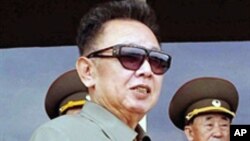Another year is ending with no tangible progress in scaling back North Korea's nuclear weapons programs. Pyongyang invested more in its weapons development as part of a broader effort to shore up power behind an ailing leader in 2009.
2009 began with a giant question mark about the health of Kim Jong Il.
The North Korean leader remained out of sight for a number of significant occasions, including the launch of a long-range rocket that angered the international community.
A few days after the launch, Mr. Kim appeared at a parliamentary session, looking gaunt and withered.
Experts say that supported the widespread belief Mr. Kim suffered a stroke.
"North Korea fed its version of the story to the people, saying the reason Kim looks this way is not because he's lost his health, but because he works day and night for the people, visiting work sites and so on," said Yang Moo-Jin, a scholar at Seoul's University of North Korean Studies.
Pyongyang also rallied public support behind the country's nuclear weapons program, and conducted its second nuclear test.
In South Korea, Donguk University professor Koh Yu-Hwan says the test was aimed at pressuring the United States.
"North Korea was showing all its cards to the Obama administration, both the rocket test and the nuclear test, giving the United States a choice between nuclear negotiations or nuclear proliferation," said Koh Yu-Hwan.
A few months later, the death of former South Korean President Kim Dae-jung offered the chance to warm diplomatic relations with the South. Senior envoys came from Pyongyang to pay respects and meet with South Korean President Lee Myung-bak, whose hard-line policies earned him the title of "traitor" in the North's official media.
Former U.S. President Bill Clinton, husband of Secretary of State Hillary Clinton, visited Pyongyang in August, to secure the freedom of two captive U.S. journalists.
"Even though Clinton's visit was mainly about the release of the two female journalists, in the bigger picture it was beneficial for both parties. It served as a milestone in making bilateral talk between North Korea and the United States possible," said Yang Moo-Jin.
President Obama visited South Korea in November, and reminded the North the path to dialogue remains open.
A U.S. envoy traveled to Pyongyang a few weeks later, and says North Korea would like to return to six nation talks about its nuclear weapons.
"We view the North as being at a moment when it can enter global society, and join the global economy safely, or it can move toward implosion as its economic crisis deepens," said Koh Yu-Hwan.
South Korean officials say that 2010 may open on bright note, with six-nation nuclear talks opening as early as January.
News
Leader's Health Scare, Nuclear Test Top Year's North Korea Headlines
- By Kurt Achin
update




